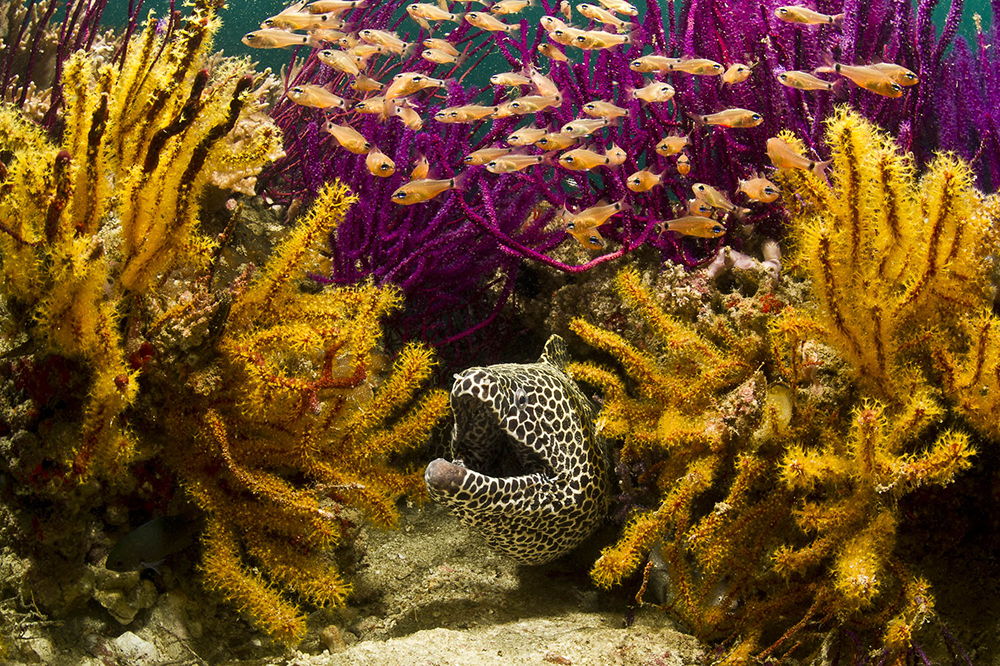By Madhavi Colton, Ph.D.; Helen Fox, Ph.D.; Lisa McManus, Ph.D.; and Malin Pinsky, Ph.D.
The trends are clear: around the world, coral reefs are dying. Just a few weeks ago we learned that we lost 14% of the world’s coral reefs in just 10 years, and that the primary driver of this decline is climate change. This obviously isn’t good news. Coral reefs support a quarter of all marine species despite occupying less than 1% of the ocean floor. They also provide food, income and storm protection to over one billion people. In total, they provide benefits worth over US$375 billion each year. If we lose coral reefs, it won’t just be a biodiversity crisis—it will also be a humanitarian and economic crisis.
As all eyes turn to the global climate summit in Glasgow this month, we have to ask: will this be the year we finally commit to saving these valuable ecosystems?
Climate change is here, and it’s only going to get worse. But despite these dire reports, humanity has a critical window of time for action. And we know this because our research shows that we still have time to save coral reefs.
We have spent the last five years of our careers as coral reef scientists investigating the best ways to protect coral reefs from the global changes coming their way, like warming ocean temperatures. We built sophisticated mathematical models to understand how and whether reefs can survive. Our results show that there is hope for coral reefs: they can adapt to cope with a warmer world, but only if we act quickly.

To give corals the best chance of adaptation, two things must happen: 1) we need to reduce local human impacts on reefs like overfishing and pollution; and 2) we must rapidly slow and then stop climate change.
Countless communities, nonprofit organizations and governments are doing their very best to reduce local stressors to reefs. They are improving water quality, reducing overfishing, and combating land-based pollution.
At the Coral Reef Alliance, we have seen the community in West End, Roatán in Honduras galvanize their resources to get a wastewater treatment plant up and running. The result has been a 99% reduction in bacteria in nearshore waters, not only making the ocean cleaner for coral reefs, but also making it more sanitary for the people who swim and fish in those waters. In Hawai’i, over 100 community volunteers have come together to keep 25 tons of sediment off the coral reefs of West Maui by reforesting degraded landscapes with native plants.
The communities that depend on coral reefs the most are doing what they can to protect their livelihoods and their homes. And while these efforts are critically important, they will ultimately be in vain if our global leaders don’t take immediate action to reduce the amount of warming that our world is on track to experience.
We need to reduce emissions, and we need to do it now. This can only be accomplished through coordinated international efforts.
If we commit to reducing carbon emissions and limiting global warming to 1.5 degrees Celsius, science indicates that corals can adapt to a warmer world. To achieve this requires immediate and dramatic global action. There is no time to waste. If COP26 in Glasgow results in real promises that lead to real change, then we still have time to avert the extinction of one of the world’s most important ecosystems.
But if we continue on our current emissions trajectory, it is going to be very difficult if not impossible for corals—and many other species—to adapt quickly enough.
That’s why we, as coral reef scientists who care deeply about what’s at stake, join faith leaders, health professionals, community members and business stakeholders in calling on world leaders to set ambitious targets to lower emissions and translate that commitment to action. If we act now, there is still hope for coral reefs and the billion people who depend on them. But if we don’t, we’re looking at a much more difficult and treacherous road ahead.
Madhavi Colton, Ph.D., Executive Director of the Coral Reef Alliance
Helen Fox, Ph.D., Conservation Science Director of the Coral Reef Alliance
Lisa McManus, Ph.D., Assistant Research Professor at the Hawai’i Institute of Marine Biology at University of Hawai’i at Manoa
Malin Pinsky, Ph.D., Associate Professor and Director of the Graduate Program in Ecology & Evolution at Rutgers University
